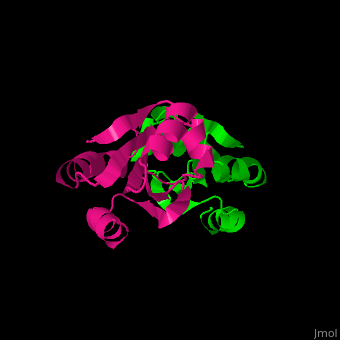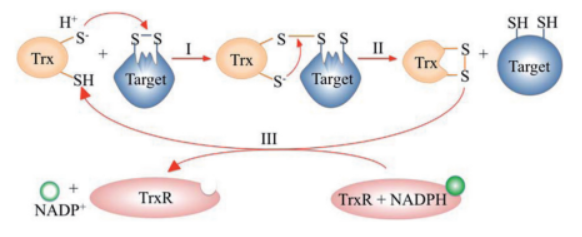We apologize for Proteopedia being slow to respond. For the past two years, a new implementation of Proteopedia has been being built. Soon, it will replace this 18-year old system. All existing content will be moved to the new system at a date that will be announced here.
Thioredoxin
From Proteopedia
(Difference between revisions)
| Line 1: | Line 1: | ||
<StructureSection load='' size='350' side='right' caption='Human thioredoxin (PDB entry [[1ert]])' scene='43/430885/Cv/2'> | <StructureSection load='' size='350' side='right' caption='Human thioredoxin (PDB entry [[1ert]])' scene='43/430885/Cv/2'> | ||
| - | == Function == | + | == Function == |
In response to the toxicity of reactive oxygen species (ROS), pathogenic organisms such as fungi possess enzymatic defense mechanisms. One such enzyme is Thioredoxin Reductase (TrxR), which plays essential roles in several biological processes including DNA synthesis, redox signaling, and oxidative stress response. Inhibiting TrxR can weaken pathogens, which may have significant implications for public health and agriculture. | In response to the toxicity of reactive oxygen species (ROS), pathogenic organisms such as fungi possess enzymatic defense mechanisms. One such enzyme is Thioredoxin Reductase (TrxR), which plays essential roles in several biological processes including DNA synthesis, redox signaling, and oxidative stress response. Inhibiting TrxR can weaken pathogens, which may have significant implications for public health and agriculture. | ||
Revision as of 12:28, 23 June 2025
| |||||||||||
References
- ↑ Gleason FK, Holmgren A. Thioredoxin and related proteins in procaryotes. FEMS Microbiol Rev. 1988 Dec;4(4):271-97. PMID:3152490
- ↑ Sumida Y, Nakashima T, Yoh T, Furutani M, Hirohama A, Kakisaka Y, Nakajima Y, Ishikawa H, Mitsuyoshi H, Okanoue T, Kashima K, Nakamura H, Yodoi J. Serum thioredoxin levels as a predictor of steatohepatitis in patients with nonalcoholic fatty liver disease. J Hepatol. 2003 Jan;38(1):32-8. PMID:12480557
- ↑ Burke-Gaffney A, Callister ME, Nakamura H. Thioredoxin: friend or foe in human disease? Trends Pharmacol Sci. 2005 Aug;26(8):398-404. PMID:15990177 doi:http://dx.doi.org/10.1016/j.tips.2005.06.005
- ↑ Weichsel A, Gasdaska JR, Powis G, Montfort WR. Crystal structures of reduced, oxidized, and mutated human thioredoxins: evidence for a regulatory homodimer. Structure. 1996 Jun 15;4(6):735-51. PMID:8805557
Proteopedia Page Contributors and Editors (what is this?)
Michal Harel, Alexander Berchansky, Laura Maria Batista Leal, Joel L. Sussman


